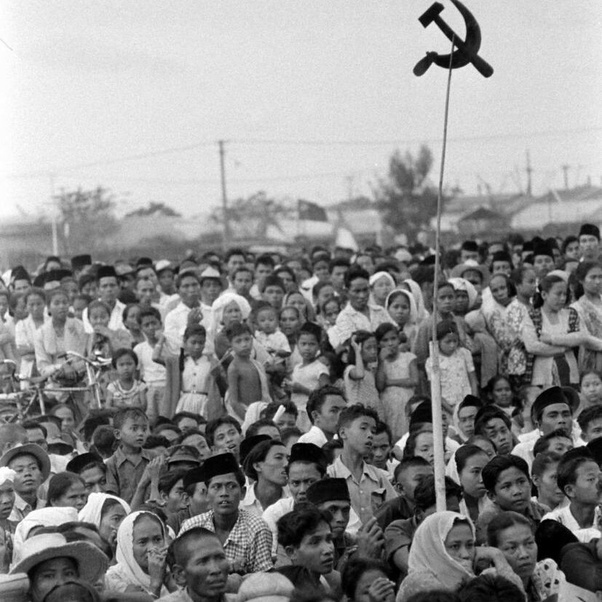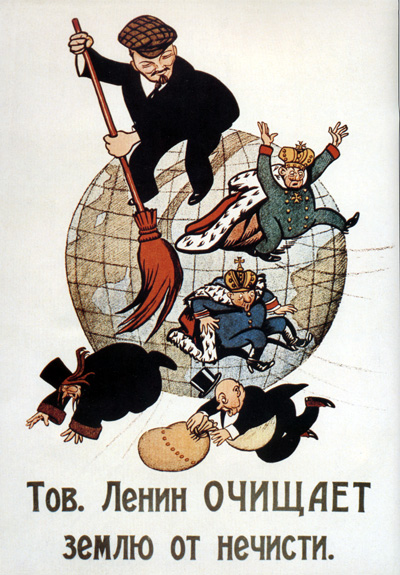On this day in 1965, the September 30th Movement assassinated six Indonesian Generals, beginning a period of West-backed mass murder of alleged communists, religious minorities, and ethnic Chinese people. At least 500,000 were killed.
The assassinations were blamed on the Communist Party on Indonesia (KPI) by the army and various civic and religious groups, and the resulting campaign of mass murder and arrests, backed by several Western powers, led to the ousting of Indonesian nationalist President Sukarno, the deaths of anywhere from 500,000 to 3 million people, and the installation of Suharto, a brazenly corrupt anti-communist, as President.
Blaming the KPI for the assassination of the generals, Suharto's forces began purging insitutions of alleged Sukarno and PKI loyalists, arresting and summarily executing many important PKI figures. As leftists, real or alleged, were violently removed from civil and military institutions, reactionaries began directing violence towards ordinary civilians.
The campaign of repression was both widespread and brutal; victims were tortured, impaled, beheaded, and rivers were left congested with masses of corpses. The most conservative estimates suggest 500,000 people were killed in total, while higher estimates range from 2-3 million.
Western powers, including the U.S., Britain, Australia, and Sweden, both supported and directly aided the anti-communist pogroms. In 1962, three years before the killings began, both the U.S. and British governments that it would be necessary "to liquidate Sukarno".
The U.S. trained more than 1,200 anti-communist military officers, providing them weapons and economic assistance. During the massacres, the U.S. supported the Indonesian military's actions, even providing the government with lists of suspected communists to target.
British Foreign Office documents declassified in 2021 revealed that British propagandists secretly incited anti-communists, including army generals, to eliminate the PKI, and used "black propaganda", propaganda intended to create the impression that it was created by those it is supposed to discredit, due to Sukarno's hostility to the formation of former British colonies into the Malayan federation from 1963.
Western media and politicians repeated false propaganda from Suharto's Indonesian government downplaying the violence while also celebrating the violent repression taking place. Australian Prime Minister Harold Holt wrote in the NY Times "With 500,000 to 1 million Communist sympathizers knocked off, I think it is safe to assume a reorientation has taken place" The NY Times also published a racist article saying the murders were to be expected in "violent Asia, where life is cheap".
American oil tycoon H. L. Hunt called Sukarno's ousting the "greatest victory for freedom since the last decisive battle of World War II." Time magazine described the suppression of the KPI "The West's best news for years in Asia" and praised Suharto as "scrupulously constitutional."
The politicide ended in 1966. Sukarno died under house arrest in 1970. Suharto would rule as head of the Western-backed military "New Order" regime for over 30 years, while amassing a personal fortune. The massacres continue to be downplayed in the official Indonesian historiography.
In his 2020 book "The Jakarta Method", journalist Vincent Bevins argues that the massacre provided the blueprint for American campaigns of suppression of leftist movements around the world. To this day, no Western government has apologized for their involvement in the Indonesian politicide.
Indonesia’s Red Slaughter - Jacobin
Megathreads and spaces to hang out:
- ❤️ Come listen to music and Watch movies with your fellow Hexbears nerd, in Cy.tube
- 💖 Come talk in the New Weekly Queer thread
- 💛 Read and talk about a current topics in the News Megathread
- 💚 Come and talk in the Daily Bloomer Thread
- ⭐️ September Movie Nominations ⭐️
reminders:
- 💚 You nerds can join specific comms to see posts about all sorts of topics
- 💙 Hexbear’s algorithm prioritizes comments over upbears
- 💜 Sorting by new you nerd
- 🌈 If you ever want to make your own megathread, you can reserve a spot here nerd
- 🐶 Join the unofficial Hexbear-adjacent Mastodon instance toots.matapacos.dog
Links To Resources (Aid and Theory):
Aid:
Theory:


This is a big point. I am really not the best to answer it, but I would say currently the main things we work with are (1) exclusion (2) social relations and social competency of charismatic people or people with standing in the community (3) having a diverse set of backgrounds (4) being present with anti-racist or at least inclusory practice (which doesn't work as well with some queer comrades of ours).
Enforce social conformity, exclude racists early on and fast
If you notice that a person is too racist and nationalistic we focus on people who are more prone to fit a baseline of social manners or younger people instead. There is also usage of social aspects. This means that we believe that there is an amount of social conformity to how people behave ("bullying works"). We have a somewhat varied age spectrum, too, so it does help if older and younger people are harsh to people sometimes, but don't discuss reasons for why racism is bad or why that is racism, but more give specific demands for the person to follow.Ambassadors to tackle social challenges with objectionable meeting behavior
There are then ambassadors (which I think are largely responsible for the stability of the org) who will outside of meetings get in touch with that person and depending on how they handle it the results vary. Some get angry and never come back, one recently did start to partake in events again and does behave now. They try to be relatable, but also use a bit of universalist morals "we all need housing", "we could build houses for all/have better material conditions" and slight anti capitalist rhetoric (mentioning specific actions by specific companies and governments in our proximity that we can actually annoy with concrete action). They try to gauge whether it is useful to have a social connection and rapport or not. Their main task is to ensure standards. I am not one of them and they are much more skilled than I am in those things. Without charismatic or sociable people it is hard to grow or remain stable (this is different during industrial action in which naturally people grow to fit the needs of the situation). This of course means that there is an exclusionary element and people who are Wagenknecht-fiends or open nationalists are somewhat left out in the rain for others to deal with.The decision making behind that is that there has to be some strength within the groups that does essential core work and while you have events you can have people participating that don't behave privately as we would like.
Those behaviors would hurt the org though and having a social base of operations means that you have to have people that trust each other and that is something you will not have with open racists.
Racism in meetings remains an unsolved problem
Big problems in meetings are unreflected racism though, mostly from people without migration experience, but people whose parents had migration experiences are brought up with racist thoughts that are sometimes hard to sport or handle (at least for me), since I lack the competency and intercultural competence to do so. One idea is that with a baseline of cooperation and intersectional action, we who work together and experience similar material or social conditions, will forge bonds as working class members, which will enable continued co-operation. This of course is a dangerous aspect, as it doesn't tackle the material base of racism, it doesn't tackle racism with the help of theory, but focuses on slightly altering the social relations and creating more class consciousness.I do agree, it helps that we have people whose parents or who themselves were or are refugees. Can't really argue against Syrian refugees if they are active in your org (well some could go the "one of the good ones" route, but they would be verbally shot down fast). Focusing on stuff in which people can take actions in their environment is one of the thoughts that are often expressed. Political apathy can be somewhat managed by having alternate social relations.
I would like to underline though that the idea behind that org is to activate people that are in spatial proximity and create a social proximity from that to create a social base of operations and thus a social base of power. It is aimed at a third of the people in your location. It isn't a union and not quite a neighborhood association for all.
Your points are quite important and others doing organizing try to deal with those people you mentioned. To give them orientation. A political party does organizing for that, other groups do try to do that, too, including housing campaigners. They have a slight difference in aims.